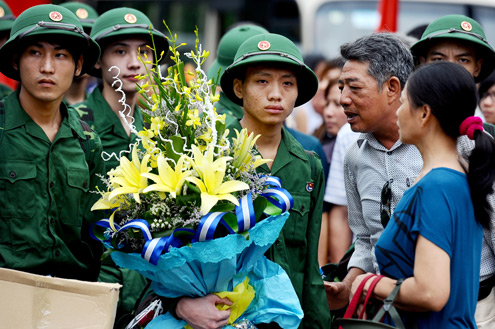Recently, the People's Committee of Ba Ria-Vung Tau province issued Directive 11/CT-UBND in 2017 on the selection and conscription of citizens for military service and the fulfillment of obligations to join the People's Police in 2018 to effectively carry out the tasks of selecting and conscripting citizens for military service and fulfilling police obligations in the following year.

In the year 2017, in the work of selecting citizens for enlistment and participation in police duties, the province successfully met both the quantity and quality criteria by selecting 1,400 citizens for military service, achieving 100% of the target, and 154 citizens for police service, reaching 85.56% of the assigned target. However, during the process of selecting and calling citizens for military service and police duties, there were still some limitations and shortcomings:
- Inadequate grasp and management of the pool of citizens ready for enlistment;- Insufficient professional responsibility of some officers (particularly at the commune and ward levels);- The management of the list of university and college graduates, or those who have completed a course, has not been promptly updated;- The process of reviewing and exempting or postponing military service was not rigorous; the verification and conclusion of personal histories were still superficial and lacked full content as required;- The health pre-screening conducted in localities was not strictly implemented...

To ensure the successful implementation of the assigned tasks, the Chairman of the Provincial People's Committee directs:
- Ensure strict implementation of the citizen selection and enlistment process for 2018 in accordance with the law. Each district and city should select at least 2% of Party members among the total number of youth enlisted compared to the target quota. If Party members are not yet official, they must be admitted 6 months (up to the enlistment date) before enlistment, and strive for 40-50% of official Party members among the enlisted Party members in districts and cities;- Selection and call for citizens for enlistment must prioritize quality, selecting citizens with good political and ethical standards, and educational backgrounds in order from highest to lowest. Graduates from university, college, and then secondary school, and if necessary, those with 8/12 education in underserved localities***(citizens enlisted for police duties must have at least a high school education)***. Selection should be from the oldest to the youngest, avoiding neglecting the pool of potential enlistees, which could lead to difficulties in subsequent years;- Military agencies at all levels must strictly follow procedures and processes for selecting citizens for enlistment, especially adhering to the “3 ballots, 4 public” policy. The commune, ward, and commune-level town must clarify citizens with lower educational backgrounds to prevent abuse of this regulation to avoid military service. Selection efforts must be combined with grassroots democratic regulations and regular monitoring to ensure social equity;- The provincial police should direct local police departments to closely coordinate with relevant agencies, especially military authorities, to advise military service councils at their level to implement military service laws and police duty laws, provide sources for enlistment, and ensure citizens meet the political and ethical standards as stipulated in Joint Circular 50/2016/TTLT-BQP-BCA and Circular 50/2012/TT-BCA. Uniform regulations on military service registration and management of citizens within the conscription age must be implemented. Citizens should be closely monitored during health screenings and upon issuance of enlistment orders for both military and police duties until the day of handover. Violations of military service registration, health exam compliance, or enlistment must be strictly handled in accordance with current legal regulations;- The Department of Education and Training is to guide educational institutions, district, and city education departments to implement military service laws. They should verify, clarify, and fully provide information on the educational backgrounds of male citizens aged 18 to 25, and those with higher education aged 26 to 27 who have had their enlistment deferred. Reports should be submitted to the appropriate People's Committees for military service review purposes, and they should be accountable to the provincial People's Committee for the educational quality in the selection process;- The Department of Health is to instruct and guide district and city Health Departments and Health Centers to cooperate with military authorities at the same level to organize health screenings for military service. Medical councils should be established for military and police health screenings, equipped adequately per Joint Circular 16/2016/TTLT-BYT-BQP for military health screening, Joint Circular 09/2009/TTLT-BCA-BYT for screening citizens for temporary police service, and Circular 140/2015/TT-BQP for enlistment procedures. Drug “4-in-1” tests and HIV screenings must be conducted as per the guidelines, and citizens should be selected from health categories 1, 2, down to 3. However, those with better health should be prioritized (for police duties, citizens must be selected from health categories 1 and 2)...
See detailed content at Directive 11/CT-UBND of 2017
 Article table of contents
Article table of contents





.Medium.png)
.Medium.png)
.Medium.png)
.Medium.png)
